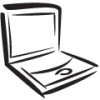Gateway M305 Gateway M305 Notebook User's Guide - Page 59
Working with files and folders, Viewing drives
 |
View all Gateway M305 manuals
Add to My Manuals
Save this manual to your list of manuals |
Page 59 highlights
Working with files and folders Working with files and folders You can organize your files and programs to suit your preferences much like you would store information in a file cabinet. You can store these files in folders and copy, move, and delete the information just as you would reorganize and throw away information in a file cabinet. Viewing drives Drives are like file cabinets because they hold files and folders. A notebook almost always has more than one drive. Each drive has a letter, usually Local Disk (C:) for the hard drive and 3½ Floppy (A:) for the optional diskette drive. You may also have more drives such as a CD, DVD, or recordable drive. To view the drives on your notebook: ■ In Windows XP, click Start, then click My Computer on the Start menu. - OR In Windows 2000, double-click the My Computer icon on the desktop. Drives www.gateway.com 49















